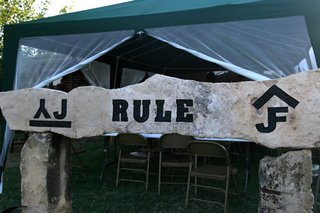Wednesday, June 28, 2006
My First Flash Animation by Clint
Monday, June 26, 2006
Dogville & A Breviary of Sin by Clint

There exists a brilliant film by Lars von Trier called Dogville. Those who have seen it are among the blessed.
There exists a brilliant book by Cornelius Plantinga, Jr. called Not the Way It's Supposed to Be: A Breviary of Sin. Those who have read it are among the blessed. I thank Brother Matt for recommending the book.
There is a cross-section of these two demographics that are nigh divine. The two articulate each other very well.
And, so writes Cornelius...
In general, we ought to pay evildoers, including ourselves, the "intolerable
comment" of taking them seriously as moral agents, of holding them accountable
for their wrongdoing. This is a mark of our respect for their dignity and weight
as human beings. After all, what could be more arrogant than treating other
persons as if they were no more responsible than tiny children or the mentally
maimed? What could be more offensive than regarding others not as players but
only as spectators in human affairs, including their own? What could be more
condescending, stultifying, and inhumane? What could be more patronizing than
the refusal to blame people for their wrongdoing and to praise them for the
rightdoing, and to ground this refusal in our ssumption that these people
have not caused their own acts or had a hand in forming their own character?
Cornelius continues...
In his Lyman Beecher lectures, William Muehl recalls the humanist passions
of Arthur Koestler, a onetime defender of communism who later became its
critic. What began to distress Koestler was that in the Soviet communist
system the concept of blame disappeared. Nobody blamed reluctant communists. Nobody blamed peasants who resented the loss of their freedoms or who resisted conversion to communism, for surely they had been corrupted by faulty social and economic conditions. Nobody blamed critics of the party line, for surely they had been brainwashed by capitalist propoganda. Instead of blame, party officials offered their opponents pity and reeducation. Of course, the cradle of such pity often turned out to be a mental hospital, and the school for such reeducation a concentration camp--places at least as confining and dehumanizing as any conventional prison. But at least none of the inmates was to blame for being there. Koestler found all this blamelessness progressively disturbing. "Before long it began to become clear that those whom we do not blame we do not regard as responsible. those whom we do not regard as responsible we do not see as fully human. And those whom we do not see as fully human we are willing to twist and manipulate to suit our own convenience."
Thursday, June 15, 2006
Family Reunion [Part 1 of 3] by Clint
 The weekend before last held the 15th (I believe) Walker Family Reunion. My grandmother was a Walker before becoming a Rule. Thus, Nicole and I participated. For the third time, the event was held in my hometown of Elk City in western Oklahoma. The main events were held at my uncle's homestead just north of town. It was a delight.
The weekend before last held the 15th (I believe) Walker Family Reunion. My grandmother was a Walker before becoming a Rule. Thus, Nicole and I participated. For the third time, the event was held in my hometown of Elk City in western Oklahoma. The main events were held at my uncle's homestead just north of town. It was a delight.




Family Reunion [Part 2 of 3] by Clint
 I discovered I am attracted to my wife in new and exciting ways.
I discovered I am attracted to my wife in new and exciting ways. Our gracious host, Fred Rule. Note how he dwarfs the weapon.
Our gracious host, Fred Rule. Note how he dwarfs the weapon. My brother Joe participating in the family reunion's No Child Left Behind Program.
My brother Joe participating in the family reunion's No Child Left Behind Program. Father and the brothers Rule.
Father and the brothers Rule.Family Reunion [Part 3 of 3] by Clint
 Dot is deaf.
Dot is deaf. This is Cindy. She got hit by a car over a year ago. Looks like a full recovery, no?
This is Cindy. She got hit by a car over a year ago. Looks like a full recovery, no?
...Not so much. Apparently, she won't stop picking at it.
 Mi familia.
Mi familia.
Sunday, June 04, 2006
Are You Ready to [read my] Ramble? by Clint
Wikipedia proclaimeth:
The most popular/notorious genre of the MMOG would be the role-playing stripe [MMORPG]. These are the ones from which you hear the horror stories of people racking up years of actual time logged into the game (sometimes unto the death of themselves or even worse). Furthermore, this is the genre that has given birth to a new kind of sweatshop that has its minions playing these games "farming" an MMORPG's currency or items of value to be sold for real money. And, let us not forget the stories of murder (you know... real murder).A Massively Multiplayer Online Game (MMOG or MMO) is a computer
game which is capable of supporting hundreds or thousands of players
simultaneously, and is played on the Internet. Typically, this type
of game is played in a giant persistent world.
MMOs enable players to compete with and against each other on a grand
scale, and sometimes to interact meaningfully with people around the world. The
friendships made on MMOs are sometimes as real as those in the real world, and
generate a large amount of online 'social capital'. However, most MMOs require
players to invest large amounts of their time into the game (drawing one away
from the real world), and are most suitable for the more serious gamer. Still,
almost anyone who enjoys video games or human interaction can enjoy an
MMOG.
These facts are terrible things. We should be aware of them, as the MMORPG genre is gaining a tremendous amount of momentum (World of Warcraft alone currently has more than six million active subscriptions).
But, my point is not to make this some call to a twisted, fundy boycott. As long as I understand the Bible to take a "use-but-do-not-abuse" stance on alcohol (with an untold number of 'active subscribers' worldwide for centuries and centuies and being the culprit for some pretty ugly goings-on), I would find it hard to condemn the game rather than the abuser.
Bare with me a while longer, as I have yet to reach the reason why I am posting--although, you must confess that the journey thus far has been worthwhile, no?
In order to continue my post, I now have to admit to having participated in an MMORPG--World of Warcraft. I had held off for many a year, despite my fascination with the potential of the genre. One of my employees gave me a week-long free pass, and I was hooked. I quickly purchased the game and started logging the hours. About five months later, I quit altogether.
Here is why. I (as well as my wife) realized that my boredom with the game and my addiction (or soon-to-be addiction) were simultaneously increasing--strange but true. My boredom is to summed up by the fact that [a] there is no real narrative/story/plot in these MMORPGs, and [b] (consequently) you start hitting the existential wall very soon.
"Of course you are hitting the existential wall," some might say. "The world you are operating in doesn't really exist."
While that is true, I am speaking from an insider's perspective. My point is that, even granting this 'metasphere' with its own reality, it still feels pretty damn pointless. The lack of a larger purpose (in this case, a larger narrative in and with which to interact) causes all of those wonderfully scary verses for which Ecclesiastes is known to begin popping into my head.
Thus, all becomes selfish pursuit. You consider your character a career--something to be constantly buffing up for nothing more than to be able to buff up some more. This is where the addiction happens. The game becomes work.
The end in mind is hardly that of bettering the community. Redeeming, destroying, or advancing/introducing any kind of larger plot the metasphere is not something on the minds of most players. Basically, they are existing for the mere novelty of existing, waiting for the expansion pack in order to accrue more wares.
Unfornately similar to so much of what I tend to experience in real life. Please allow me to continue.
An MMORPG by the title of SecondLife [SL] has been around for a couple years. It is by no means a Tolkien-inspired RPG. SL is a contemporary metasphere... and that is it. You buy stuff. You chat with other folks. You might sell a good (such as property, housing, or skank-tacular clothes) or service. It is the ironic quintessence of materialism. There is no large purpose but to spend money. And, did I mention that these people are spending real money in this game? (the front page of the SL website keeps a running tally of the amount of money that is transacted in the SL world--it breaks $200,000 daily.
Vanity of vanities, all is vanity. But, wait... perhaps all is not so vain--at least not in such a democratized, homogeneous way.
Way back in the day when Where Are My Pants? (a band of which I was once a member), we had a slip-shod website. The guestbook entry form had a number of shallow, odd questions in order to invoke entertaining answers. We figured we could sprinkle a bit more humor to the form by juxtaposing a very though-provoking, deep question against all the silly, shallow questions. The question had to with the matter of no longer having great, extraordinary men in our societies. By 'great' and 'extraordinary', we did not only mean 'exceptionally beneficent' but also 'exceptionally evil'.
Then we allowed them a 25-character text box to answer the question--ROFL!!~!~`1
SL, despite that fact that it tends to brag on its "social pleasentries" [I say "blech"] and the possibility to generate revenue in the game [I say "blech"], teeters on being a truly brilliant social experiment or another sedated MMORPG. For this glinting of brilliance, one must seek out the alternative media of SL. Therein are stories of those who are trying to redeem their virtual world, stories of those trying to destroy their virtual world, stories of people taking advantage of people, and stories of ol-fashioned depravity set in a virtual world. SL residents have the ability to code, free from any constraints of SL developers, things into existence--be it a Pokemon poster or a functional nuclear warhead. It depends upon the talent of the resident. Residents are also able free to do just about anything they want as well. There are very few constraints.
While I certainly don't necessarily condone a number of actions covered in the above stories, it affirms the presence of substantial free will ['gasp'] enough to not only accomplish impressive feats but to introduce and advance story in the MMO environment. It also allows for the rise of the 'exceptional men' that are lacking in our societies.
When I was slightly more immature in my thinking, my response to reading Schaeffer (or someone like him) and his (their) perspective on the rotting foundation of our increasingly anthropocentric society was something along the lines of,"Hell! If they refuse the existence of the sovereignty of [the Christian] God, then tell them to stop camping out on Christianity's front lawn. Grant them their due anarchy, and, yet again, we shall see what people group rises from the ashes of Rome." As a young, single, collegiate man living in the very fortunate, present-day U.S. experiencing the "cage stage" of Calvinism, anarchy seems like something I could handle--especially if it resulted in an excellent illustration of how incredibly correct I was.
But, I don't so much desire anarchy nowadays. I have come to be at ease with merely knowing how incredibly correct I am. But, I can't help but want to see this fantasy play out in a virtual world. I'll be honest; the privilege to witnessing the nuances of a society spiral out of control excites me. Thus, I hope against hope, the developers of SL refrain from allowing the metasphere to become disturbingly homogeneous. Perhaps if I catch word that the SL environment is growing epically erratic, I shall join in and attempt spreading the gospel... by way of a holy crusade that crushes all the opposed. I will issue an invitation for companions for said crusade in my church's sunday morning announcements.
Give me Stalin and Saint Paul,
Give me Christ,
or give me Hiroshima.
-Leonard Cohen, "The Future"
Posting
Watching
Reading
Clicking
it is copyrighted ...essentially.









